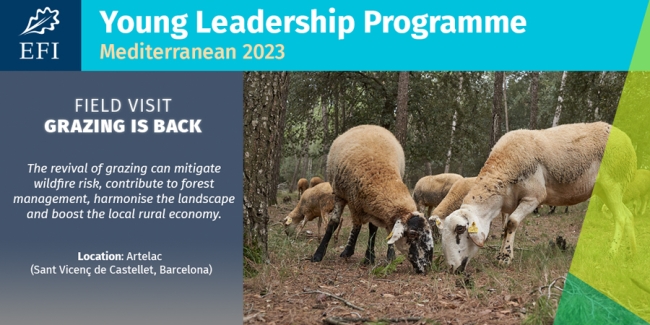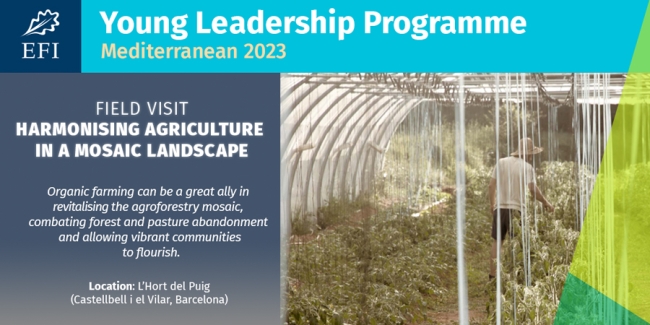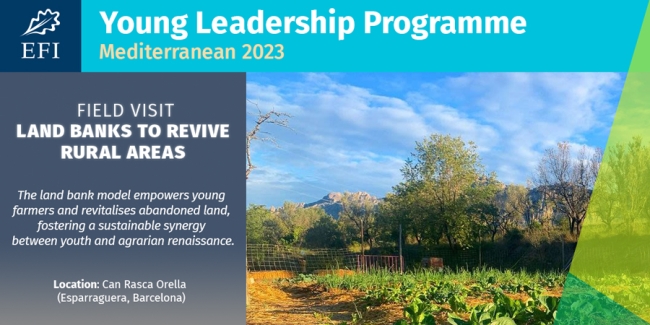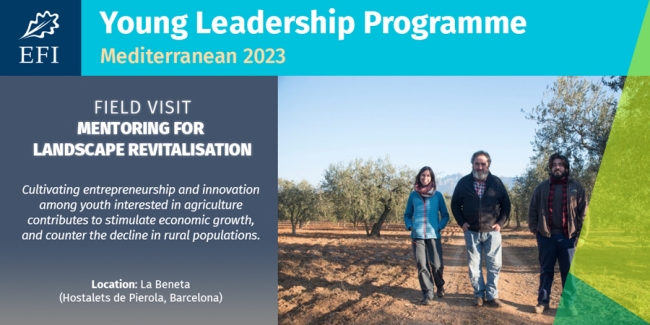Capacity building field visit in the Montserrat Rural Park
Wednesday, 4 October 2023
For the visit, participants will be divided into two groups that will meet local actors at two stops each in the Monserrat Rural Park, located in Barcelona province. The two groups will then meet for a common lunch.
Please click here to download the agenda of the visit.
Below we list the four technical stops that will take place during the visit
(two per group):
- VISIT A: GRAZING IS BACK
-
Background:
Valentina Muñoz, a devoted shepherd of dairy goats at Artelac in Sant Vicenç de Castellet, brings her unique story to life. Hailing from Castellgalí, she was born in Italy and followed her heart from the realm of veterinary medicine to a profound dedication to livestock. As a shepherdess, Valentina tends to her cherished goats with unwavering passion, crafting a dream job deeply rooted in her love for both animals and the sprawling outdoors. Amidst the challenges of demanding days, Valentina's commitment is a testament to her boundless affection for her vocation and her unyielding connection to the land. Her endeavors extend to grazing her animals within the woods of Montserrat Rural Park, where she also plays a pivotal role in the family business, helping them in the artisanal production of artisanal cheese and other dairy products.Purpose of the visit:
Venturing into the domain of grazing revival, this visit unveils the pivotal role of livestock in forest management and fire prevention. Valentina Muñoz's narrative encapsulates the essence of this resurgence, illuminating how diligent herding can mitigate the risk of wildfires while harmonizing with the landscape. By exploring Valentina's journey, we delve into the interplay between pastoral traditions and modern environmental imperatives, spotlighting the intricate dance that safeguards both culture and nature. - VISIT B: HARMONISIG AGRICULTURE IN A MOSAIC LANDSCAPE
-
Background:
A resolute and dedicated young man, a decade ago Nil Puig embarked on a mission to breathe life into the dormant family land nestled within Montserrat Rural Park, which had long awaited the touch of professional cultivation. Nil's vision was crystal clear: he aspired to cultivate an organic haven, adorned by products that would bear the esteemed certification of the Catalan Council for Ecological Agricultural Production (CCPAE). Today, strolling through Hort del Puig is an enchanting experience. The sinuous ranks of lettuces and leeks, adorned by glistening dewdrops on cabbage leaves, resonate harmoniously with the symphony of birdsong, all set against the awe-inspiring backdrop of the Montserrat massif.Purpose of the visit:
This visit beckons us to explore the heart of sustainable agriculture, where Nil Puig's journey resonates as an emblem of ecological stewardship within Montserrat Rural Park's dynamic landscape. It also sheds light on the pivotal role of safeguarding the agroforestry mosaic that defines the broader Barcelona region. Encompassing a remarkable 66.8% of the territory, Barcelona's sprawling forests weave an exquisite tapestry mirroring nature's abundance. Yet, within this grandeur lies a pressing concern—a tale of unchecked forest expansion, driven by the abandonment of once-cultivated fields and grazing pastures. Coupled with the looming spectre of escalating global warming, this backdrop casts a shadow of heightened vulnerability to forest fires.Guided by the BCN Smart Rural strategy, the Barcelona Provincial Council charts a course to revitalize the agroforestry mosaic, recognizing the need to bring this intricate dance between forests, pastures, and cultivated plots into a more resilient equilibrium. Nil Puig's endeavours exemplify this spirit, as he navigates challenges on seemingly unyielding terrain to cultivate, irrigate, and mechanize.
Hort del Puig emerges as a tangible embodiment of the Farm to Fork Strategy, a blueprint harmonizing sustainable practices with the cadence of nature. Nil's narrative encapsulates this synergy, spotlighting the ripple effect of ecologically conscious cultivation. From these fields springs forth sustenance not only for the earth but also for vibrant communities. Amidst Nil's flourishing vegetable garden, we witness the pulse of sustainability—a balance restored, a promise upheld.
- VISIT C: LAND BANKS TO REVIVE RURAL AREAS
-
Background:
Tatiana Segura and Sergi Ruiz have realized their agricultural aspirations through the innovative platform of the Land Bank Network, an initiative championed by the Provincial Council of Barcelona. Against the majestic backdrop of the Montserrat massif, Tatiana and Sergi are turning their shared vision, Can Rasca Orella, into a reality. Supported by the technical expertise of the Rural Park of Montserrat's Land Bank, this dedicated duo secured a three-hectare farm nestled between Esparreguera and Collbató. Presently, their focus is on crafting a permaculture training venture, poised to deliver immersive workshops and nature-centric activities. Amidst their pursuits, they cultivate a breathtaking garden and meticulously prune their olive groves for a youthful vitalityPurpose of the visit:
Delving into the transformative role of land banks, this visit illuminates the process of repurposing dormant and underutilized land into thriving agricultural hubs, a journey embodied by Tatiana Segura and Sergi Ruiz. By availing themselves of the Land Bank's support, young and emerging farmers gain access to secure contracts, bolstered by legal backing. The Land Bank model provides a shield against the uncertainty of abrupt evictions, offering a vital sense of stability. It underscores the patience required in nurturing the land, a vital aspect of cultivation that extends beyond a mere year or two, recognizing the profound regenerative process. Aspiring farmers are eager to sow, yet the art of land rejuvenation unfolds gradually, a journey of dedication spanning not just years, but seasons of care and commitment. Through Tatiana and Sergi's narrative, we uncover the profound impact of land banks in empowering young farmers and revitalizing abandoned land, fostering a sustainable synergy between youth and agrarian renaissance. - VISIT D: MENTORING FOR LANDSCAPE REVITALISATION
-
Background:
Joan Raventós, at the age of 66, boasts over four decades of experience in cultivating fruit trees, almond trees, and olive trees. Since 2006, he has been operating under an ecological certification, showcasing his commitment to sustainable practices. In his enduring dedication to orchard cultivation, Joan has taken on the role of a mentor. His guidance extends to Marta and Pepe, two aspiring young agriculturists who are eager to carry forward the legacy of Joan’s orchard even beyond his retirement.Purpose of the visit:
The primary objective of this visit is to exemplify the crucial role of mentorship in revitalizing multifunctional Mediterranean landscapes, highlighting its significance in addressing challenges such as declining biodiversity, the risk of fires, and the loss of cultural heritage. By showcasing the inspiring journey of retiring farmer Joan Raventós, who has dedicated over four decades to cultivating fruit trees, almond trees, and olive trees under ecological certification, we aim to underscore how mentorship can effectively counteract the detrimental impacts of factors like land abandonment, eroding traditional agro-silvo-pastoral practices, and urban migration.Joan's experience illuminates the potential of mentorship to bridge generational gaps, ensuring the transfer of valuable knowledge and fostering a connection to the land. His guidance to Marta Valls and Josep González, two young and passionate farmers eager to carry forward his legacy, serves as a testament to how mentorship can nurture a new generation of agricultural stewards. By forging this intergenerational link, we seek to contribute to the reutilization of abandoned land, promoting biodiversity conservation, ecological restoration, and a sustainable, thriving rural community. Furthermore, Joan's story underscores the economic prospects inherent in mentorship-driven land management. By cultivating entrepreneurship and innovation among youth interested in agriculture and nature conservation, we endeavor to reverse the trend of rural-urban migration, stimulate economic growth, and counter the decline in rural populations. Ultimately, this visit highlights the synergy between mentorship, sustainable land management, and economic development, showcasing a holistic approach that safeguards cultural heritage, renews landscapes, and safeguards biodiversity for a vibrant future.



